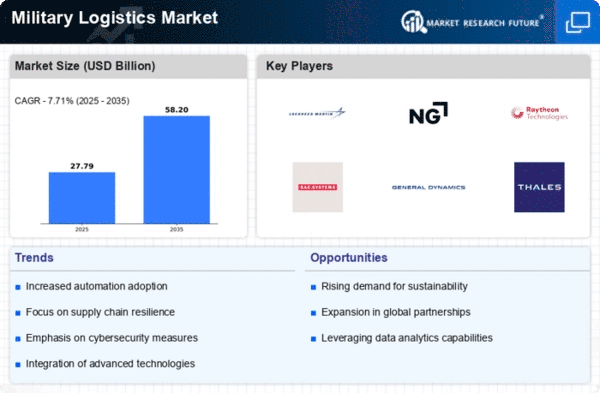Top Industry Leaders in the Military Logistics Market

Strategies Adopted:
Global Reach and Presence: Key players in the military logistics market maintain a global presence to support military operations and projects worldwide, leveraging extensive networks of facilities, suppliers, and partners.
Integrated Logistics Support: Companies adopt integrated logistics support (ILS) strategies to optimize the lifecycle management of defense systems, ensuring readiness, reliability, and cost-effectiveness throughout their operational lifetimes.
Technology Integration: Integration of advanced technologies such as data analytics, artificial intelligence (AI), and predictive maintenance enables companies to enhance logistics efficiency, optimize inventory management, and reduce downtime for military assets.
Partnership and Collaboration: Collaboration with defense agencies, government organizations, and industry partners is crucial for key players to deliver comprehensive logistics solutions, address customer requirements, and capture new opportunities in the market.
Key Companies in the Military Logistics Market include.
AECOM
Fluor Corporation
Thales Group
BAE Systems Plc
DynCorp International LLC
Honeywell International Inc.
Lockheed Martin Corporation
ASELSAN A.S.
Anham FZCO
Factors for Market Share Analysis:
Capability and Experience: Market share analysis considers the capability, experience, and track record of companies in delivering logistics solutions for military customers, including their ability to meet complex requirements and operate in challenging environments.
Contract Wins and Performance: Companies' success in winning and executing defense logistics contracts, as well as their performance in meeting delivery schedules, cost targets, and quality standards, influences their market share and reputation.
Innovation and Differentiation: Innovation in logistics technologies, processes, and services, as well as differentiation based on value-added offerings such as predictive maintenance, cybersecurity, and sustainability initiatives, can set companies apart in the competitive landscape.
New and Emerging Companies:
KBR, Inc.: KBR provides logistics, engineering, and technical services to defense and government customers, offering a diverse portfolio of solutions for mission-critical operations.
Fluor Corporation: Fluor offers logistics and sustainment services for defense infrastructure and facilities, specializing in construction, maintenance, and operations support in austere environments.
DynCorp International: DynCorp provides logistics, aviation, and security solutions to military and government clients, focusing on mission support, contingency operations, and training services.
Industry News and Current Company Investment Trends:
Digital Transformation: Companies in the military logistics market are investing in digital transformation initiatives to modernize their operations, enhance visibility and control over supply chains, and improve decision-making processes.
Autonomous Systems: The adoption of autonomous systems such as unmanned aerial vehicles (UAVs) and unmanned ground vehicles (UGVs) is increasing in military logistics for tasks such as cargo transport, surveillance, and resupply operations.
Sustainability and Resilience: There is growing emphasis on sustainability and resilience in military logistics, with companies focusing on reducing environmental impacts, optimizing energy usage, and enhancing supply chain resilience against disruptions and contingencies.
Overall Competitive Scenario:
The military logistics market is characterized by intense competition among key players, driven by evolving defense requirements, technological advancements, and changing geopolitical dynamics. Companies differentiate themselves through their global reach, integrated logistics capabilities, and technology leadership. New entrants and emerging companies seek to carve out niche positions by offering innovative solutions, specialized expertise, and agile approaches to address evolving customer needs. Collaboration with defense customers and industry partners, along with investment in advanced technologies and capabilities, is essential for companies to maintain competitiveness and sustain growth in the dynamic military logistics market.
Military Logistics Industry
Developments
For instance, September 2022
Conti Federal Services, a government construction and engineering company specializing in military and secure construction in the United States, signed a contract worth USD 140.9 million with the United States Army Corps of Engineers (USACE) to construct a new aircraft complex at Francis E. Warren Air Force Base in Cheyenne, Wyoming.
For instance, May 2022
Hensel Phelps Construction Co. received a contract worth USD 531.7 million from the United States Army Corps of Engineers to build flightline area facilities at Tyndall Air Force Base in Florida. The Department of Defense announced that the 11-facility construction project includes site improvement detection, protection features, and security enhancements.











